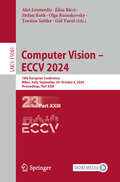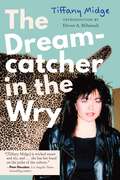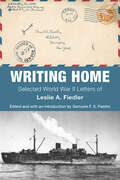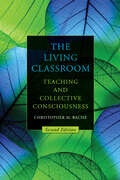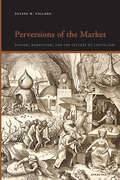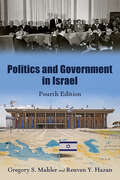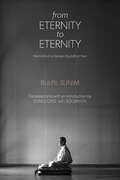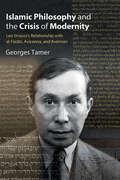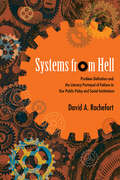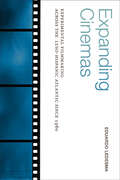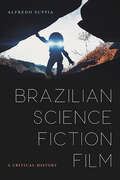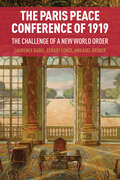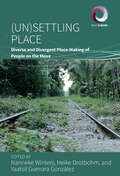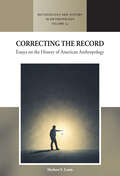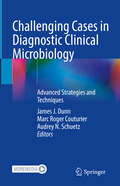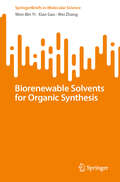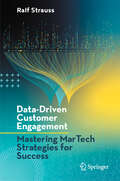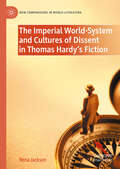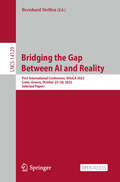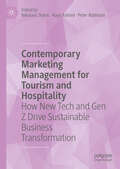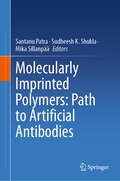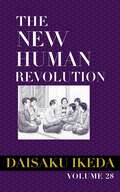- Table View
- List View
Sonography of the Infant’s Hip: Principles, implementation and therapeutic consequences
by Reinhard Graf Claudia Maizen Tamara SeidlThis textbook, offers a quick and easy introduction to the fundamentals of hip sonography as standardised screening tool for detecting developmental dysplasia and dislocation of the hip (DDH), thus allowing for early treatment in the neonatal period. An evidence based treatment algorithm, as well as tips and tricks for both the novice and the expert user, offer additional insight into common mistakes and technical difficulties. Prof Graf, the founder of hip sonography, has, together with other leading experts in this field, compiled everything you need to know about hip sonography, into this comprehensive, well illustrated textbook. Main features are: Checklists for reporting Summaries for swift revision Practice section with real life examples and ultrasound pictures A complete syllabus for hip ultrasound courses Illustrations for baby positioning and scanning technique Ultrasound based treatment guidelines for DDH This textbook will be an invaluable reading for paediatric orthopaedic surgeons, paediatricians, physiotherapists, radiologists and sonographers and anyone involved in DDH care.
Computer Vision – ECCV 2024: 18th European Conference, Milan, Italy, September 29–October 4, 2024, Proceedings, Part XXIII (Lecture Notes in Computer Science #15081)
by Aleš Leonardis Elisa Ricci Stefan Roth Olga Russakovsky Torsten Sattler Gül VarolThe multi-volume set of LNCS books with volume numbers 15059 up to 15147 constitutes the refereed proceedings of the 18th European Conference on Computer Vision, ECCV 2024, held in Milan, Italy, during September 29–October 4, 2024. The 2387 papers presented in these proceedings were carefully reviewed and selected from a total of 8585 submissions. They deal with topics such as computer vision; machine learning; deep neural networks; reinforcement learning; object recognition; image classification; image processing; object detection; semantic segmentation; human pose estimation; 3d reconstruction; stereo vision; computational photography; neural networks; image coding; image reconstruction; motion estimation.
The Dreamcatcher in the Wry
by Tiffany MidgeThe Dreamcatcher in the Wry, Tiffany Midge&’s bitingly hilarious collection of essays written during the COVID-19 pandemic, builds on the critical acclaim of her earlier book Bury My Heart at Chuck E. Cheese&’s. A Standing Rock Sioux citizen, Midge offers up her unique satire about the foibles of politics, consumerism, world affairs, pandemic anxieties, and other subjects from the pandemic years of 2020 through 2023.The Dreamcatcher in the Wry brims with insight, considering pig heart transplants, wedding-crashing grizzly bears, truffle-snuffling dogs, bison-petting tourists—and a plethora of other animal and wildlife hijinks—not to mention wienermobiles, the controversial Mount Rushmore, meeting Iron Eyes Cody in a parade, Elizabeth Warren&’s quaint family lore, and Buffy Sainte-Marie. Midge brilliantly unpacks her observations and day-to-day concerns through the lens of an urban-raised Lakota living in the West, a writer of poetry, op-eds, church bulletins, fridge magnets, and Twitter posts who is allergic to horses and most outdoor recreation—except for berry picking and the occasional romp through a dewy meadow. Turning over the colonizer&’s society and culture for some good old Native American roasting, Midge informs as she entertains, gleaning wisdom from the incongruities of daily life with a much-needed dose of Indigenous common sense.
Writing Home: Selected World War II Letters of Leslie A. Fiedler
by Leslie A. FiedlerThe letters in Writing Home offer a glimpse into a crucially formative period in the life of Leslie A. Fiedler, one of the greatest literary critics and American public intellectuals of the twentieth century. Written to his wife and two sons between May 1944 and December 1945, while he was serving as a cryptologist and translator for the Office of Naval Intelligence, they contain firsthand accounts of his experiences in various locations in the Pacific Theater, including Hawai'i, Iwo Jima, Okinawa, Guam, and China. Constrained by Navy censors from writing directly about his work as an intelligence officer, he writes, instead, on a variety of themes, events, places, and war situations, including the ethical contradictions between a war fought for and in the name of freedom on the one hand and the oppression of indigenous Hawai'ians and prisoners of war on the other. He also questions the mainstream, European-centered view of the war and provides new insights into the role of Jewish servicemen in World War II. Finally, the letters document the beginning of the formation of American intellectual life in the years preceding the Cold War, forcing us to rethink certain premises of American exceptionalism in the second half of the twentieth century. Taken together, they offer a unique and fascinating immersion into history through the eyes of one of the makers of post–World War II American literary culture.
The Living Classroom, Second Edition: Teaching and Collective Consciousness
by Christopher M. BacheA pioneering work in teaching and transpersonal psychology, The Living Classroom explores the dynamics of collective consciousness in the classroom. In this second edition, Bache has, in his own words, "come out of the psychedelic closet," speaking candidly about the role that psychedelics played in the development of his integral, holistic pedagogy. Combining scientific research with personal accounts collected over thirty years, Bache examines the subtle influences that radiate invisibly around teachers as they work—unintended, cognitive resonances that spring up between teachers and students in the classroom. While these kinds of synchronistic connections are often overlooked by traditional academics, Bache demonstrates that they occur too frequently and are too pointed to be dismissed as mere coincidence. Drawing upon Rupert Sheldrake's theory of morphic fields, Bache proposes that well-taught courses generate "learning fields" around them, forms of collective consciousness that can trigger new insights and startling personal transformations. Moving beyond theory, this book is rich with student stories and offers practical, hands-on strategies for teachers who want to begin working with these learning fields to take their teaching to a more conscious level.
Perversions of the Market: Sadism, Masochism, and the Culture of Capitalism (SUNY series, Insinuations: Philosophy, Psychoanalysis, Literature)
by Eugene W. HollandPerversions of the Market argues that capitalism fosters sadism and masochism—not as individual psychological proclivities but as widespread institutionalized patterns of behavior. The book is divided into two parts: one historical and the other theoretical. In the first, Eugene W. Holland shows how, as capital becomes global in scale and drives production and consumption farther and farther apart, it perverts otherwise free markets, transforming sadism and masochism into borderline conditions and various supremacisms. The second part then turns to Deleuze and Guattari's "schizoanalysis," explaining how it helpfully embeds Freud's analysis of the family and Lacan's analysis of language within an analysis of the capitalist market and its psycho-dynamics. Drawing on literature and film throughout to illuminate the discontents of modern culture, Holland maintains that the sadistic relations of production and masochistic relations of consumption must be eliminated to prevent capitalism from destroying life as we know it.
Politics and Government in Israel, Fourth Edition
by Gregory S. Mahler Reuven Y. HazanThis balanced and comprehensive text explores Israeli government and politics from both institutional and behavioral perspectives. After briefly discussing Israel's history, authors Gregory S. Mahler and Reuven Y. Hazan examine the social, religious, economic, cultural, and military contexts within which Israeli politics takes place. They explain the operation of political institutions and behavior in domestic politics, such as the constitutional system; parliamentary government; and the executive, legislative, and judicial machinery of government, including discussion of elections and voting, political parties and civil society, and democracy in Israel. Finally, Israel's foreign policy setting and apparatus are considered, as well as the challenges faced by the Palestinians in Israel and the peace process between Israel and its neighbors. Clear and concise, Politics and Government in Israel provides an invaluable starting point for all readers needing a cogent introduction to Israel today.
From Eternity to Eternity: Memoirs of a Korean Buddhist Nun
by Bulpil SunimFrom Eternity to Eternity is the story of Bulpil Sunim, arguably the most respected female Seon (Zen) master in Korea. Written with candor and an unpretentious sense of humor, her memoir provides both a fascinating record of her life and a deeply accessible window into Buddhist thought and spirituality. Describing and reflecting on her own experience of meditation and her journey as a woman in a male-dominated religious practice, she reveals the largely unknown realities of female monastic life in Korea. She also provides an unprecedented glimpse into her relationship with her father, the legendary Seon Master Seongcheol Sunim, who was widely considered a living Buddha in Korea. This lyrical autobiography, the first of its kind in Korean Buddhist literature, offers readers a chance to learn about Korean Seon meditation and practice from a woman’s perspective and will be of interest not only to scholars of Buddhism but to general readers curious about Buddhism, the experiences of religious women, or simply the remarkable life of a great spiritual leader.
Islamic Philosophy and the Crisis of Modernity: Leo Strauss's Relationship with al-Fārābī, Avicenna, and Averroes (SUNY series in the Thought and Legacy of Leo Strauss)
by Georges TamerThis study examines the impact of the medieval Muslim philosophers al-Fārābī, Ibn Sīnā (Avicenna) and Ibn Rushd (Averroes) on Leo Strauss. Through meticulous source analysis, Georges Tamer critically evaluates Strauss's interpretation of their works. Furthermore, he explores how Islamic philosophy shaped Strauss's understanding of Maimonides and Plato, providing a compelling solution to the modernity crisis he identified. Offering fresh perspectives on the evolution of Strauss's thought and his distinctive approach to Arabic sources, Tamer sheds light on the pivotal role of al-Fārābī, the most significant Muslim philosopher in Strauss's view, including key aspects of al-Fārābī's political philosophy and his nuanced take on Plato's ideas. Islamic Philosophy and the Crisis of Modernity is a valuable addition to current scholarship on Strauss. Both philosophically erudite and philologically rigorous, Tamer presents the reader with a balanced perspective on Strauss's insights without being overly reverential or dismissive.
Systems from Hell: Problem Definition and the Literary Portrayal of Failure in Our Public Policy and Social Institutions (SUNY series in New Political Science)
by David A. RochefortThis book approaches contemporary fiction as a medium for policy advocacy, one whose narrative devices both link it to, and distinguish it from, other forms of public discourse. Using the framework of political agenda setting, David A. Rochefort analyzes the rhetorical function of problem definition played by literary works when they document and characterize social issues while sounding the call for systemic reform. Focusing on a group of noteworthy realist novels by American authors over the past twenty years, this study maintains that fictional narrative is a potentially influential instrument of "empathic policy argument." The book closes by examining the agenda-setting dynamics through which a social problem novel can contribute to the process of policy change.
Expanding Cinemas: Experimental Filmmaking across the Luso-Hispanic Atlantic since 1960 (SUNY series in Latin American Cinema)
by Eduardo LedesmaThis is the first book on experimental cinemas of Latin American and Spain to offer a comprehensive look at old and new technologies, including Super 8, VHS, cell phones, virtual reality, artificial intelligence, and more. From the militant films of the 1960s to today's expanded reality experiences, filmmakers in Argentina, Spain, Cuba, Colombia, Brazil, and Mexico have continually used alternative formats both to dialogue with international movements and to counter commercial cinematic trends. To make this argument and cover this vast geographic and historical terrain, Eduardo Ledesma adopts a transnational and intermedial approach, examining exchanges and associations between cineastes to better understand how their films were created and circulated. Ledesma works to untangle both the relations between media and the associations of experimental cinema to cultural phenomena such as diaspora, exile, displacement, and immigration. Throughout the book, connections are further made to other global avant-garde and alternative cinemas and formats, including in the United States.
Brazilian Science Fiction Film: A Critical History (SUNY series in Latin American Cinema)
by Alredo SuppiaThis book offers a pioneering critical history of Brazilian science fiction (SF) cinema, from its first appearances in the mid-twentieth century to the present. Though frequently overlooked by scholars, SF cinema from the Global South has reinvigorated the genre in recent decades. In this comprehensive study—the first of its kind in either English or Portuguese—Alfredo Suppia draws out the unique features and universal resonance of SF film in Brazil, a country that has fittingly been called "the land of the future." In Suppia's analysis, Brazilian SF stems from and responds to a long history of inequality in which everyday reality has often resembled a movie-like dystopia. Analyzing both short and feature films in the context of social, political, and economic transformations, Suppia rethinks SF film in general from a southern perspective.
The Paris Peace Conference of 1919: The Challenge of a New World Order
by Laurence Badel, Eckart Conze Axel DröberFor more than a century, the Paris Peace Conference of 1919 has remained an object of historical scrutiny. As an attempt to consolidate peace in the wake of World War I and to prevent future conflict, it was instrumental in shaping political and social dynamics both nationally and internationally. Yet, in spite of its implications for global conflict, little consideration has been given to the way the Paris Peace Conference constructed a new global order. In this illuminating and geographically wide-ranging reassessment, The Paris Peace Conference of 1919 reconsiders how this watershed event, its diplomatic negotiations and the peace treaties themselves gave rise to new dynamics of global power and politics. In doing so it highlights the way in which the forces of nationality and imperiality interacted with, and were reshaped by, the peace.
Haunting Futures: Crisis, Migration and Anticipation in Iceland (New Anthropologies of Europe: Perspectives and Provocations #10)
by Marek PawlakThe 2008 economic collapse in Iceland sent its residents into a destabilising crisis with far-reaching, temporal and affective consequences. Haunting Futures explores how the complex relationships of this unstable past and the anticipatory modes of the ongoing present keep Icelanders and the Polish migrant community in their midst alert to looming futures in crisis. It offers insights into timely crisis-ridden impacts and imaginings, migration processes and social understandings and practices. Through its attention to how people engage with crisis temporally and affectively, the book presents the crisis not simply as an isolated and distressing event but as a spectre embodied in time through ongoing anticipation.
**Missing**: Diverse and Divergent Place-Making of People on the Move (Worlds in Motion #14)
by Nanneke Winters, Heike Drotbohm and Yaatsil Guevara GonzálezPeople who are “on the move,” particularly migrants and the displaced, often inhabit places that are considered temporary, peripheral, and remote. (Un)Settling Place recentralizes these “out-of-the-way” places as key sites in the shaping of people’s mobility and identities. Ranging from the surveillance and care that migrants experience to the re-creation of social ties and the re-claiming of space, this collection volume seeks to show how a critical approach to in-between place-making can challenge the idea of place as fixed, singular, or one-directional, offering new ways of understanding migrant trajectories.
Correcting the Record: Essays on the History of American Anthropology (Methodology & History in Anthropology #51)
by Herbert S. LewisThe critique of twentieth-century American anthropology often portrays anthropologists of the past as servants of colonialism who “extracted” information from indigenous peoples and published works causing them harm. Herbert S. Lewis recovers the reality of the first century of American anthropology as a vital scholarly discipline that rejected established ideas of race, insisted on the value of very different ways of life, and delivered irreplaceable ethnographic studies. This volume presents powerful refutations of the accumulated damaging myths about anthropology’s history.
Artificial Intelligence in Education: A Machine-Generated Literature Overview
by Myint Swe KhineThis comprehensive volume explores the possibilities, challenges and ethical considerations of Artificial Intelligence (AI) in education through a machine-generated literature review that examines emerging research trends and findings. Each chapter presents summaries of pre-defined topics and includes a human-written introduction by the book editor. It covers critical areas such as educational data mining, learning analytics, personalised learning, adaptive assessment, intelligent tutoring systems, as well as the ethical challenges of AI in education. This volume provides valuable insights for educators, researchers, policymakers and students seeking to understand the transformative potential of AI in education. It serves as a reference point for navigating the evolving landscape of AI-assisted learning and offers a glimpse into the future of education in an AI-driven world. The auto-summaries were generated by a recursive clustering algorithm using the Dimensions Auto-summariser from Digital Science. The editor of this book selected the SN content to be auto-summarised and decided the order of appearance. Please note that these are extractive auto-summaries, consisting of original sentences, but are not representative of the original paper, as we do not show the full length of the publication. Please note that only published SN content is represented here and that machine-generated books are still at an experimental stage.
Challenging Cases in Diagnostic Clinical Microbiology: Advanced Strategies and Techniques
by James J. Dunn Marc Roger Couturier Audrey N. SchuetzThis book aims to communicate, educate and inform readers about important facts and new information related to the practice of clinical microbiology and how laboratory testing can be used to provide data impactful to diagnose, treat and manage patients with infectious diseases. This information is important for individual patient outcomes as well as general public health. The book will provide real world examples of how infectious disease diagnostic tests are applied to algorithms to guide the differential diagnosis and facilitate the diagnosis and treatment of patients. Each section of cases based on the type of organisms involved will be preceded by a discussion of the laboratory methods routinely used to diagnose those types of infections. Most importantly, each illustrated case will be structured to include details of the clinical presentation, differential diagnosis, relevant laboratory findings, pathogen identified, and a brief review of other potential etiologies for the clinical syndrome described. The field of clinical microbiology has evolved considerably over the last couple of decades and the technological advances continue to come at a rapid pace. By incorporating these advancements into the clinical cases, readers will gain a greater understanding of the intricacies and nuances of the performance and utility of these newer tests, as well as how the results should be interpreted for various patient populations. Readers will acquire a wide breadth of knowledge through comprehensive reading of these cases and will benefit greatly from increased familiarity with the practice of clinical infectious disease diagnostics. Envisioned as an instructional text for those already practicing in or training in the field of clinical microbiology, this book will serve clinical pathologists, clinical microbiologists, allied healthcare professionals and physicians, as well as medical students, clinical laboratory scientists and trainees, medical residents, and infectious disease and microbiology fellows. It will be a tool to learn about and enhance skills in the discipline through presentation and discussion of cases and methods. While trainees such as medical students, residents, and fellows will benefit by thinking about the whole process from patient to lab to appropriate treatment- following the structure of board exams- those already in the field will broaden their knowledge base with information on the most up-to-date testing methods and algorithms used in the clinical microbiology lab.
Biorenewable Solvents for Organic Synthesis (SpringerBriefs in Molecular Science)
by Wen-Bin Yi Xiao Gao Wei ZhangIn this brief the authors introduce a series of recently developed bio-based solvents including cyclopentyl methyl ether (CPME), γ-valerolactone (GVL), 2-methyl tetrahydrofuran (2-MeTHF), propylene carbonate (PC), and cyrene. Traditional organic solvents used for organic synthesis (such as benzene, ether, chloroform) have a series drawbacks on toxicity, environmental impact, and safely related issues. In addition, the fossil fuel-derived organic solvents are not sustainable. Therefore the development of biorenewable solvents is a topic of current interest. For each of the solvents, their production, toxicity profile, renewable pathway, and their utility in organic synthesis, biosynthesis, and separation processes is discussed. The target audiences of this book are organic and medicinal chemists with interests in using green solvents. It can also be used as a reference for undergraduate and graduate courses related to organic and green chemistry.
Data-Driven Customer Engagement: Mastering MarTech Strategies for Success
by Ralf StraussEmbark on a journey through the rapidly evolving landscape of Marketing Technology (MarTech) with this comprehensive guide. From understanding the strategic imperatives driving MarTech adoption to navigating the intricacies of data-driven customer interaction, this book provides invaluable insights and practical strategies. Explore topics ranging from budget allocation and market potential to data readiness and GDPR compliance, gaining a deep understanding of key concepts and best practices. Whether you're grappling with the complexities of AI integration or seeking to optimize measurement and KPIs, this book equips you with the knowledge and tools needed to thrive in today's digital marketing environment. With decades of industry experience, Ralf Strauss offers in this book a roadmap for success, empowering marketers to navigate the challenges and seize the opportunities presented by MarTech innovation.
The Imperial World-System and Cultures of Dissent in Thomas Hardy's Fiction (New Comparisons in World Literature)
by Rena JacksonThis is the first book-length study of imperial crossings in Thomas Hardy’s novels and short stories. Combining the strengths of world-literary and world-systems analyses with a cultural materialist approach, the study offers unparalleled coverage of global links in Hardy’s fiction, engaging, in addition, with a range of dissenting responses – at both formal and thematic registers – to the British world-system’s exploitative structures. Hardy’s prose outputs reveal that the empire, contrary to popular critical assumptions in postcolonial studies, did not harmonise the classes, genders or regions into a shared national imperial identity, culture or destiny. A major component of the study additionally includes comparative readings of the 'modern' world-system and imperial sociality in writings by Joseph Conrad, H. Rider Haggard, Elizabeth Gaskell, Rudyard Kipling, David Livingstone, and in Chartist poetry. The book will be an invaluable resource to teachers, students and enthusiasts working in the field of world literature, and in Victorian, postcolonial and settler colonial studies.
Bridging the Gap Between AI and Reality: First International Conference, AISoLA 2023, Crete, Greece, October 23–28, 2023, Selected Papers (Lecture Notes in Computer Science #14129)
by Bernhard SteffenThis open access book constitutes revised selected papers from the First International Conference on Bridging the Gap between AI and Reality, AISoLA 2023, which took place in Crete, Greece, in October 2023. The papers included in this book focus on the following topics: The nature of AI-based systems; ethical, economic and legal implications of AI-systems in practice; ways to make controlled use of AI via the various kinds of formal methods-based validation techniques; dedicated applications scenarios which may allow certain levels of assistance; and education in times of deep learning.
Contemporary Marketing Management for Tourism and Hospitality: How New Tech and Gen Z Drive Sustainable Business Transformation
by Nikolaos Stylos Roya Rahimi Peter RobinsonHospitality and tourism is the second largest industry in the world and is a driver of job growth and economic prosperity, accounting for 1 in 10 jobs worldwide. As such, the marketing of hospitality and tourism is a fast developing field, influenced by the latest advances in sustainability and social marketing as well as a new generation of consumers. Gen Z individuals and Gen Alphas are the future employees and consumers of this industry. They do not only shape new consumption patterns, but also bring their values to work life, thus changing the attitudes towards the employee-employer relationship and how work is being done. As Generation Z will represent more than 50% of the workforce worldwide in the next few years, it is of utmost importance to explore their particular behavior in both the working environment, as well as their consumption patterns. As such, this contributed volume brings a focus on the contemporary marketing (and management) aspect of thetourism and hospitality industry as this is/will be shaped by Smart / Industry 4.0 apps, priority over sustainable futures, and Gen Z and Alpha individuals’ aspirations, expectations, preferences and behaviors. The latest technological advancements and the challenges associated to a sustainable planet will be decisive factors in tourism and hospitality marketing. The authors offer insights into numerous aspects into the hospitality and tourism industry, making it an invaluable reference point for contemporary tourism and hospitality marketing research.
Molecularly Imprinted Polymers: Path to Artificial Antibodies
by Santanu Patra Sudheesh K. Shukla Mika SillanpääThe book delves into the intricate realm of Molecularly Imprinting Polymers (MIPs) functioning as artificial antibodies. The book explores several subjects, such as the basic principles, historical development, methods for creating and analyzing MIPs, creation of specific recognition sites, computational modeling, responsive behavior to stimuli, and the nano-scale applications of MIPs. Furthermore, it emphasizes the pivotal role of MIPs in the detection of cancer, infectious diseases, and the detection of bacteria and viruses. In addition, the book explores the field of different sensor technologies, specifically focusing on MIP-based electrochemical and optical sensors. It also highlights how these sensors might be integrated into wearable, flexible, and chip sensors. In addition, the book explores developing technologies and potential future applications of MIPs as artificial antibodies. This book offers a complete grasp of the promise and limitations of MIPs by providing insights into their challenges and real-time applications. The book will be a useful resource for researchers, students, professionals, and practitioners in bioengineering, biotechnology, medicine, and ethics.
The New Human Revolution, vol. 28 (The New Human Revolution #28)
by Daisaku IkedaThrough this novelized history of the Soka Gakkai— one of the most dynamic, diverse, and empowering movements in the world today— readers will discover the organization's goals and achievements even as they find inspiring and practical Buddhist wisdom for living happily and compassionately in today's world. The book recounts the stories of ordinary individuals who faced tremendous odds in transforming their lives through the practice of Nichiren Buddhism and in bringing Buddhism's humanistic teachings to the world. This inspiring narrative provides readers with the principles with which they can positively transform their own lives for the better and realize enduring happiness for themselves and others.

